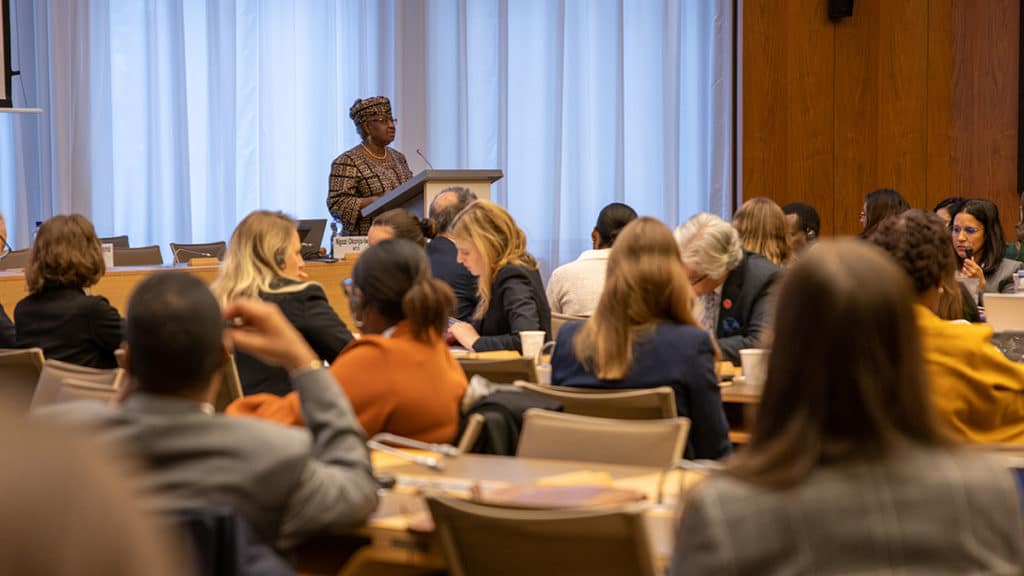El congreso sobre comercio y género comienza con un llamamiento a una recuperación inclusiva y respaldada por la investigación

En la sesión inaugural de alto nivel del Congreso Mundial del Comercio sobre el Género, celebrada el 5 de diciembre, los oradores dijeron que las mujeres se ven mucho más afectadas por las crisis mundiales, y la investigación es fundamental para garantizar que la política comercial contribuya de manera eficaz a una recuperación que tenga en cuenta las cuestiones de género. Al inaugurar esta conferencia sobre la investigación, la Directora General Ngozi Okonjo-Iweala dijo que la OMC está avanzando en la dirección correcta y que la investigación ayudará a mostrar el camino.
(de momento sólo en inglés)
«Crises are not gender neutral. We need to act, and we need to act now,» DG Okonjo-Iweala said to kick off the first international research conference on trade and gender, which is taking place on 5-7 December at the WTO in Geneva, Switzerland.
Thirty researchers from around the world are set to present their latest findings on harnessing gender-responsive trade policies to help economies recover from the polycrisis of the pandemic, the war in Ukraine, high energy and food prices, and climate change, which the Director-General noted has widened the economic and social divide between men and women.
«WTO economists find that tariffs are higher on female labour-intensive goods. Female labour-intensive services sectors face greater trade restrictiveness. Trade costs associated with the need for face-to-face interaction tend to be larger in sectors where women are overrepresented,» DG Okonjo-Iweala said.
«This is why we are here today, so researchers can not only present their diagnostics, but come up with concrete solutions that can help women,» she said, adding that WTO members are also exploring how to enhance trade rules at the Informal Working Group on Trade and Gender, understand gender impacts of food safety measures at the Standards and Trade Development Facility, and support the International Trade Centre’s (ITC) outreach to women traders.
«We are moving in the right direction, but we have a long way to go. We need good research to show us the way,» DG Okonjo-Iweala said.
Kemi Badenoch, the United Kingdom’s Secretary of State for International Trade and Minister for Women and Equalities, said data and research helped the UK Government uncover women’s labour concerns during the pandemic as well as address exporting challenges faced by women-led enterprises. «We can generate more gains by targeting support and that leads to economic growth and job creation,» she said. «At the 13th Ministerial Conference, we’ll be pressing for an ambitious declaration recognizing barriers to trade for women and how we can overcome them.»
María Luisa Hayem Brevé, El Salvador’s Minister of Economy, highlighted that women’s representation in leadership roles is also critical for crisis response and economic recovery. «The fact that there was an equal amount of women and men leading the different agencies that were key in solving all the issues that came with a pandemic was important, and El Salvador is now recognised as being one of the countries that better managed the pandemic not only on the health front but also on the economic side of things,» she said.
Pamela Coke Hamilton, ITC Executive Director, said digitalization and connectivity were other important determinants of women’s economic empowerment and resilience. «One of the things that was clear during COVID-19 was how impactful going digital was for women businesses. The importance of having digital access and connectivity for women is going to be even more critical as we move towards more e-commerce, more online marketing, and all the other measures that are now being affected by the digital framework,» she said. Ms Badenoch likewise noted that, beyond goods trade, digital services and investment must also be considered in a comprehensive trade strategy for women.
Pedro Manuel Moreno, Deputy Secretary-General of the United Nations Conference on Trade and Development, affirmed that women are disproportionately more affected than men in the ensuing cuts to public spending, tighter access to finance, school absence due to families’ income loss, and gender-based violence. «Today, the saying that ‘trade is gender neutral’ has been overcome. But we still have a long journey to go,» he said. «We should be more cognizant of power structure and the different roles women and men play as producers, consumers, and decision makers.»
New Zealand Ambassador Clare Kelly moderated the session. The video recording of the session is available here. The Congress programme is available here.















